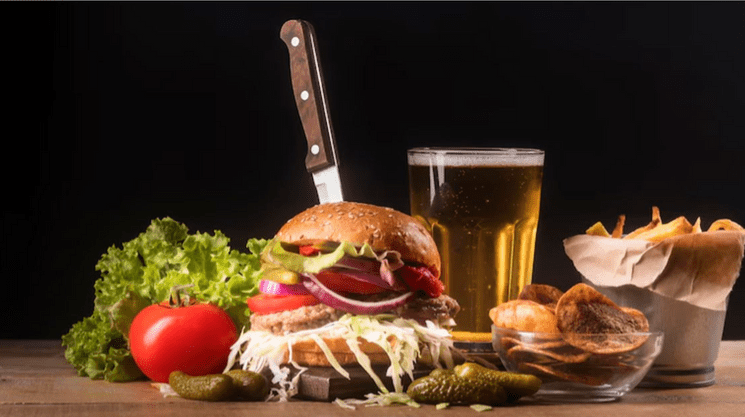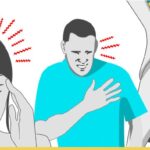Cancer is one of the leading causes of death worldwide, with millions of new cases diagnosed each year. While genetics and environmental factors play a role, your diet is one of the most significant influences on your risk of developing cancer. Research has shown that certain foods, particularly those high in additives, preservatives, and unhealthy fats, can increase your likelihood of developing cancer.
In this article, we’ll discuss the 10 cancer-causing foods you must avoid in order to reduce your risk and protect your long-term health. We’ll explore why these foods are harmful and provide healthier alternatives that are both nutritious and cancer-fighting.
The Link Between Diet and Cancer
Many studies have shown that your food choices can either increase or decrease your risk of cancer. Some foods contain chemicals and compounds that can damage cells and DNA, leading to mutations that can trigger cancerous growths. Other foods may contribute to inflammation in the body, weakening the immune system’s ability to fight off cancer cells.
By avoiding certain foods, you can significantly lower your risk of developing various types of cancer, including colorectal, breast, stomach, and liver cancers. This guide will help you become aware of foods that may be increasing your cancer risk, so you can make healthier decisions for your body.
1. Processed Meats (Bacon, Sausages, Hot Dogs)
Why They Are Harmful
Processed meats such as bacon, sausages, hot dogs, and deli meats are commonly preserved using chemicals like nitrates and nitrites. These compounds can form carcinogenic nitrosamines when they are metabolized in the body. The World Health Organization (WHO) has classified processed meats as a Group 1 carcinogen, meaning there is sufficient evidence that they increase the risk of colorectal cancer.
Healthier Alternatives:
- Opt for fresh, lean meats like chicken or turkey, or plant-based alternatives like tofu, tempeh, or seitan.
- Try smoking or grilling fresh meat at home to avoid added chemicals.
2. Refined Sugar and High-Fructose Corn Syrup
Why They Are Harmful
Excessive consumption of refined sugar and high-fructose corn syrup (HFCS) has been linked to several health problems, including obesity, insulin resistance, and inflammation. These conditions can increase the risk of cancer, especially pancreatic, breast, and colon cancer. Sugar feeds cancer cells, promoting their growth and spread.
Healthier Alternatives:
- Use natural sweeteners like honey, maple syrup, or stevia.
- Choose whole fruits for natural sweetness, as they are rich in fiber and antioxidants.
3. Fried Foods (French Fries, Fried Chicken, etc.)
Why They Are Harmful
Fried foods are often cooked at high temperatures, which can lead to the formation of acrylamide, a chemical compound that has been found to be a potential carcinogen. Foods like french fries and fried chicken are particularly high in acrylamide, which has been linked to an increased risk of ovarian, endometrial, and pancreatic cancer.
Healthier Alternatives:
- Opt for baking, grilling, or steaming instead of frying.
- Use healthier oils, like olive oil or avocado oil, which have a higher smoking point.
4. Charred Meats
Why They Are Harmful
Grilling or barbecuing meat at high temperatures can create harmful chemicals called heterocyclic amines (HCAs) and polycyclic aromatic hydrocarbons (PAHs), both of which are linked to an increased risk of stomach, colorectal, and pancreatic cancer. These compounds form when meat is cooked at high temperatures, especially when it’s charred.
Healthier Alternatives:
- Marinate meats in herbs and spices before grilling to reduce the formation of HCAs.
- Opt for lower-temperature cooking methods like baking, poaching, or slow-cooking.
5. Alcohol
Why It Is Harmful
Alcohol has long been linked to an increased risk of liver, mouth, throat, esophagus, and breast cancer. When the body metabolizes alcohol, it produces acetaldehyde, a toxic compound that can damage DNA and contribute to the development of cancer. The risk is higher for those who consume alcohol in large quantities over time.
Healthier Alternatives:
- Limit alcohol intake to moderate levels (one drink per day for women, two for men).
- Consider alcohol-free alternatives or enjoy mocktails to reduce overall alcohol consumption.
6. Artificial Sweeteners (Aspartame, Saccharin, etc.)
Why They Are Harmful
While artificial sweeteners like aspartame, saccharin, and sucralose are often marketed as safe alternatives to sugar, studies have raised concerns about their potential carcinogenic properties. Some research suggests that prolonged use of artificial sweeteners can contribute to the development of bladder, brain, and breast cancer.
Healthier Alternatives:
- Use natural sweeteners like stevia, monk fruit extract, or raw honey.
- Limit processed food that contains artificial sweeteners, focusing on whole, unprocessed options.
7. Canned Foods (Especially with BPA Linings)
Why They Are Harmful
Canned foods, particularly those with linings made of bisphenol-A (BPA), can increase the risk of cancer. BPA is an endocrine disruptor, meaning it can interfere with hormone regulation in the body, potentially leading to breast and prostate cancers. Additionally, some canned foods may contain added preservatives, which have been linked to an increased risk of cancer.
Healthier Alternatives:
- Choose BPA-free cans or opt for fresh or frozen foods instead of canned varieties.
- Store food in glass jars or stainless steel containers to avoid BPA exposure.
8. Microwave Popcorn
Why It Is Harmful
Microwave popcorn can be packed with artificial flavoring, including diacetyl, a chemical linked to lung cancer. Additionally, the non-stick coating on microwave popcorn bags often contains perfluorooctanoic acid (PFOA), which is associated with testicular and kidney cancer.
Healthier Alternatives:
- Make your own popcorn using organic kernels on the stove or in an air popper.
- Try seasoning with nutritional yeast, herbs, and spices instead of butter.
9. Hydrogenated Oils and Trans Fats
Why They Are Harmful
Hydrogenated oils and trans fats are artificial fats that have been linked to an increased risk of heart disease and cancer, especially breast and colon cancer. These fats can cause inflammation, disrupt cellular function, and promote the growth of cancer cells.
Healthier Alternatives:
- Choose healthy oils like olive oil, coconut oil, or avocado oil.
- Avoid processed snacks and baked goods that contain trans fats and hydrogenated oils.
10. Farmed Salmon
Why It Is Harmful
While salmon is a healthy source of omega-3 fatty acids, farmed salmon can contain high levels of PCBs (polychlorinated biphenyls), which are toxic chemicals linked to cancer. These chemicals are stored in the fatty tissues of the fish and can be passed on to humans when consumed.
Healthier Alternatives:
- Choose wild-caught salmon instead of farmed varieties, as it contains fewer toxins.
- Consider other sources of omega-3s like flaxseeds, chia seeds, and walnuts.
FAQs:
1. What foods should you avoid to reduce cancer risk?
Avoid foods that contain harmful chemicals, such as processed meats, refined sugars, fried foods, alcohol, and artificial sweeteners. Also, steer clear of canned foods with BPA linings and microwave popcorn that contains harmful additives.
2. Can food cause cancer?
Yes, certain foods can increase the risk of cancer by introducing harmful chemicals into your body or promoting inflammation and cell damage. Foods like processed meats, french fries, and refined sugars are among the most significant contributors.
3. Are there cancer-fighting foods?
Yes! Foods rich in antioxidants, such as berries, leafy greens, and cruciferous vegetables (like broccoli and cauliflower), can help protect your body from cancer by fighting oxidative stress and supporting immune function.
4. How does alcohol contribute to cancer?
Alcohol increases the production of acetaldehyde, a toxic substance that damages DNA. Chronic alcohol consumption is associated with cancers of the mouth, throat, liver, and breast.
5. Is it safe to eat microwave popcorn?
Microwave popcorn can contain harmful chemicals like diacetyl and PFOA, which may increase the risk of cancer. It’s safer to make your own popcorn at home using organic kernels.
Conclusion: Protect Your Health by Avoiding Cancer-Causing Foods
Making smarter food choices can significantly reduce your risk of developing cancer. By avoiding processed meats, refined sugars, fried foods, and other harmful items, you can protect your body from the damaging effects of carcinogens and promote a healthier lifestyle. Instead, focus on eating nutrient-dense, whole foods that are rich in antioxidants, fiber, and healthy fats to support your long-term health.
By being mindful of the foods you consume, you can play a proactive role in preventing cancer and living a longer, healthier life.






